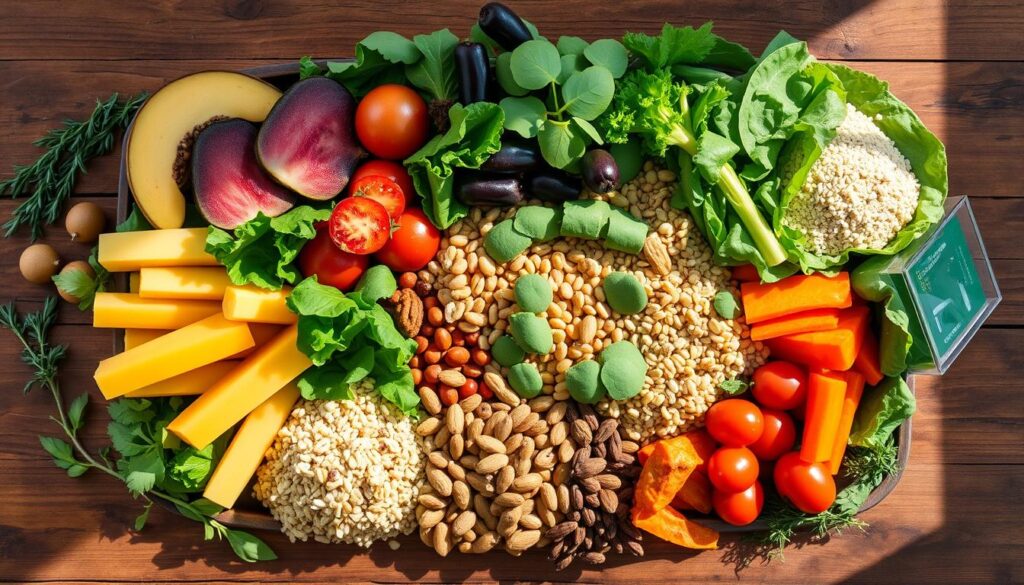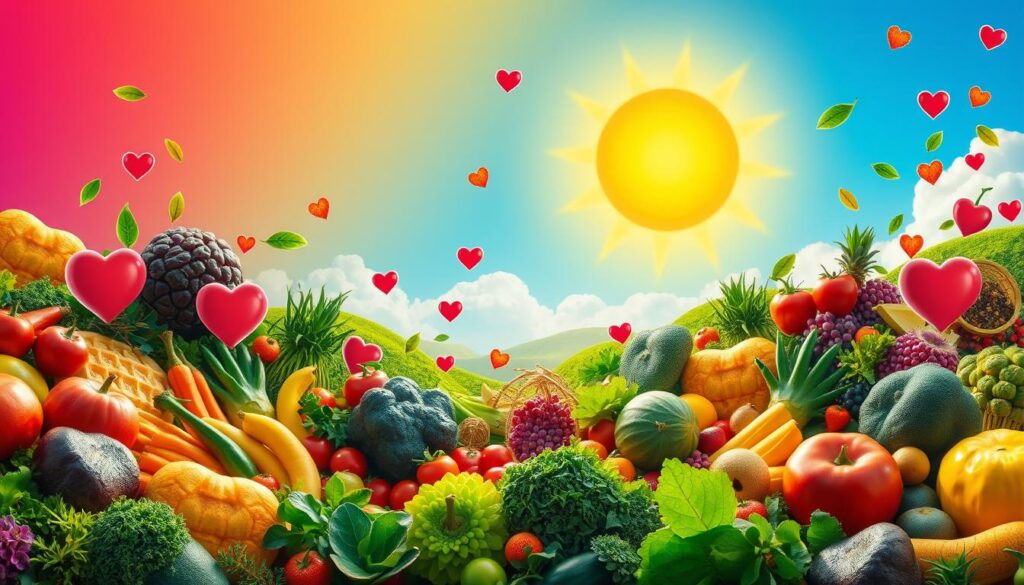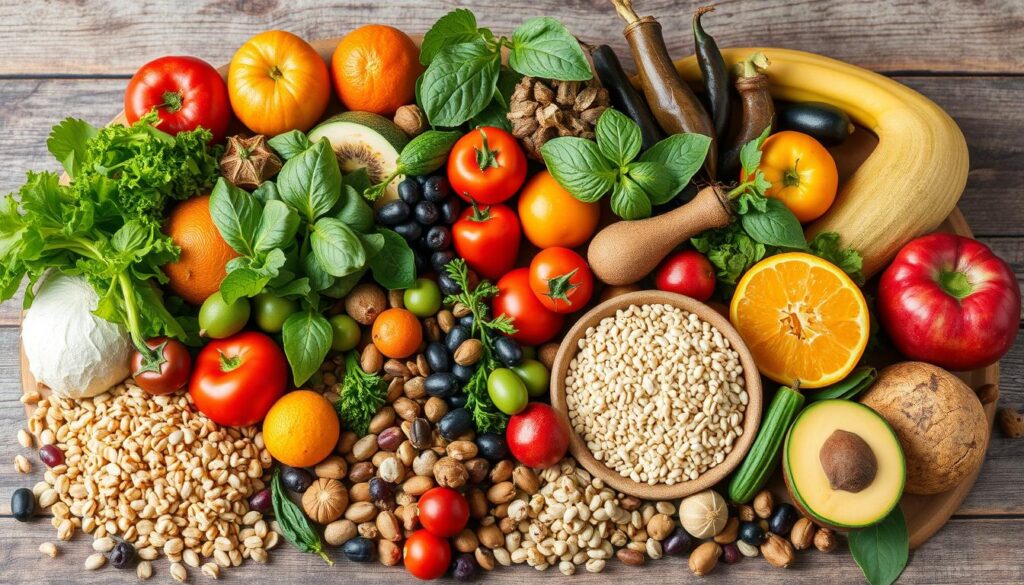Start an exciting journey into plant-based living! This guide is for everyone, whether you’re new or already vegan. It covers cruelty-free lifestyle and ethical eating. You’ll learn about plant-based nutrition, health benefits, and how it helps the planet. Are you ready to change how you see food and live more kindly?
Key Takeaways
- Discover the core principles of a balanced vegan diet for optimal health.
- Explore the remarkable health advantages of plant-based living.
- Learn to navigate social situations and dining out as a vegan.
- Understand the environmental impact of your food choices and how to reduce your carbon footprint.
- Utilize cutting-edge tools like Food Scan Genius to simplify your vegan shopping experience.
Understanding the Fundamentals of a Vegan Diet
Explore the basics of vegan diets and learn about plant-based nutrition. Whether you’re starting out or want to know more, we’re here to help!
Defining Plant-Based Nutrition
A vegan diet focuses on eating whole, unprocessed plant foods. This includes fruits, veggies, grains, legumes, nuts, and seeds. It excludes animal products like meat, dairy, and eggs.
Key Principles of Vegan Eating
- Focus on whole, unprocessed foods
- Ensure a balanced intake of essential nutrients
- Experiment with new plant-based ingredients and recipes
- Respect and support ethical and sustainable food systems
Common Misconceptions
Let’s clear up some myths about vegan diets. A well-planned vegan diet can give you all the nutrients you need. With the right knowledge, switching to plant-based nutrition can be healthy and fulfilling.
“A balanced vegan diet can absolutely provide all the nutrients the human body needs.” – Registered Dietitian, Jane Smith

Understanding the basics is key to successful ethical eating. Find what works for you and your needs. Next, we’ll look at the health perks of a vegan lifestyle!
Health Benefits of Plant-Based Living
Choosing a plant-based lifestyle brings many health benefits. It can improve your heart health and boost your energy. This way of eating is not only good for you but also for animals and the planet.
A plant-based diet can lower your risk of heart disease. It does this by cutting out animal products high in fat and cholesterol. This helps keep your blood pressure and cholesterol levels in check, making your heart healthier.
But there’s more. Eating plants can also lower your risk of type 2 diabetes, some cancers, and even brain decline. Plant foods are full of antioxidants, fiber, and essential nutrients. These help your body work better and stay healthy.
Plant-based living also helps the environment. By eating fewer animal products, we reduce our carbon footprint. This makes our planet healthier, too. It’s good for us and the Earth.
Eating a plant-based diet is one of the most powerful ways to improve your health and reduce your environmental impact.” – Dr. Michael Greger, author of “How Not to Die
So, if you want to feel more energetic, support your heart, or help the planet, try a plant-based lifestyle. It’s a step towards a healthier, greener future.

Getting Started with a Vegan Diet
Starting a vegan lifestyle is exciting and rewarding. We’ve put together a guide to help you. It covers stocking your pantry, equipping your kitchen, and meal planning. Follow these tips to make tasty plant-based meals easily!
Pantry Essentials
A well-stocked vegan pantry is key for easy meals. Here are the must-haves:
- Whole grains: quinoa, brown rice, oats, bulgur
- Legumes: lentils, chickpeas, black beans, kidney beans
- Nuts and seeds: almonds, walnuts, chia seeds, flaxseeds
- Nut butters: peanut, almond, cashew
- Healthy oils: extra-virgin olive oil, avocado oil, coconut oil
- Spices and herbs: cumin, turmeric, paprika, basil, oregano
- Condiments: soy sauce, Dijon mustard, balsamic vinegar
- Non-dairy milk alternatives: almond, soy, oat, coconut
Kitchen Tools and Equipment
The right kitchen tools make vegan cooking easier and more fun. Here are the essentials:
- High-quality chef’s knife
- Blender or food processor
- Instant Pot or slow cooker
- Spiralizer for veggie noodles
- Baking sheets and casserole dishes
- Reusable storage containers
Meal Planning Basics
Learning to plan meals is crucial for a balanced vegan diet. Here are some tips:
- Schedule a weekly meal planning session
- Incorporate a variety of plant-based nutrition
- Prepare components in advance for easy assembly
- Embrace leftovers and batch cooking
- Utilize online resources and meal planning apps
With these basics, you’ll be making delicious, healthy vegan meals in no time. Happy cooking!
Essential Nutrients for Vegans
Starting a plant-based diet means knowing what nutrients your body needs. It’s key to get these from your vegan food choices. Let’s look at the important vitamins and minerals you should focus on.
Protein Power
Protein is vital for muscle, repair, and energy. Many think it’s hard to get enough on a vegan diet. But, there are many plant-based foods that offer plenty of protein. Legumes, nuts, seeds, and whole grains are great choices.
Vitamin B12 Boost
Vitamin B12 is a big concern for vegans. It’s important for blood cells, nerves, and energy. Since it’s mainly in animal foods, vegans need to take supplements or eat fortified foods.
Iron and Zinc Essentials
Iron and zinc are also key for vegans. Iron helps carry oxygen, and zinc boosts the immune system and healing. Eat iron-rich foods like spinach, lentils, and tofu. Pair them with vitamin C foods to better absorb iron.
Calcium for Strong Bones
Calcium is essential for strong bones. Luckily, there are many plant-based nutrition sources. Leafy greens, fortified milks, and tofu are all good options.
By eating a variety of plant-based foods, you can meet your nutritional needs. This way, you can enjoy the health benefits of a vegan diet.
A balanced vegan diet can provide all the nutrients your body needs to function optimally.
Plant-Based Protein Sources and Alternatives
Exploring plant-based protein is exciting! Whether you’re new to veganism or a pro, getting enough protein is key. There are many tasty and healthy options to try.
Complete Protein Combinations
Getting complete proteins on a vegan diet is easy. Mix different plant-based foods to get all the amino acids your body needs. Here are some great combos:
- Rice and beans
- Hummus and whole-wheat pita
- Nut butter and whole-grain toast
- Quinoa and roasted vegetables
Meat Substitutes
The plant-based meat scene is booming. You can find everything from veggie burgers to sausages. These alternatives are not only tasty but also packed with protein. Some favorites include:
- Beyond Meat
- Impossible Foods
- Gardein
- Tofurky
Protein-Rich Vegetables and Legumes
Don’t overlook the protein in veggies and legumes. These foods are full of nutrients and can be the base of a vegan diet. Some top protein sources are:
| Vegetable | Protein (g per serving) |
|---|---|
| Spinach | 5.0 |
| Broccoli | 4.6 |
| Lentils | 18.0 |
| Chickpeas | 15.0 |
With a bit of creativity, you can easily meet your protein needs on a vegan diet. Explore the many options and enjoy delicious, nutritious plant-based proteins!
Navigating Social Situations and Dining Out
Being vegan can make social situations and dining out a bit challenging. But, with the right strategies, you can enjoy a cruelty-free lifestyle with confidence. Whether it’s a family gathering, a work event, or dining with friends, we’ve got you covered.
Communicating Your Dietary Needs
First, clearly and confidently communicate your dietary needs. When making reservations or talking to the host, mention your vegan preferences. Feel free to ask about menu options or request changes to fit your ethical eating habits.
Vegan-Friendly Dining Spots
Researching beforehand is key. Look for vegan-friendly restaurants or places with many plant-based options. Apps like Happy Cow can help you find great, cruelty-free dining spots.
Navigating Non-Vegan Events
- Offer to bring a vegan dish to share, ensuring there’s something you can enjoy.
- Politely decline non-vegan items and focus on the company and conversation, not the food.
- Suggest vegan-friendly restaurants or cafes for the group to try after the event.
| Vegan-Friendly Dining Tips | Benefits |
|---|---|
| Communicate your dietary needs | Ensures your requirements are met and avoids any awkward situations |
| Research vegan-friendly restaurants | Provides you with a variety of delicious, cruelty-free dining options |
| Offer to bring a vegan dish to share | Allows you to enjoy the event while contributing to the group |
Remember, a vegan diet is more than just food. It’s a lifestyle choice that shows your ethical values. With some preparation and confidence, you can handle any social situation and dining experience while staying true to your cruelty-free lifestyle.
Environmental Impact of Plant-Based Eating
Choosing veganism is more than a personal choice. It’s a powerful way to help our planet. By eating plant-based, we can greatly reduce our environmental impact. This choice helps create a more sustainable future.
Carbon Footprint Reduction
Animal-based foods, like meat and dairy, produce a lot of greenhouse gases. Plant-based foods, on the other hand, have a much lower carbon footprint. Switching to vegan can cut your carbon emissions by up to 73%.
Water Conservation Benefits
Animal agriculture uses a lot of water. It takes a lot of water to produce meat, eggs, and dairy. Going vegan can save up to 1,100 gallons of water per day. This helps save our planet’s limited water resources.
Sustainable Agriculture
- Plant-based farming is more environmentally friendly and animal-welfare focused. It uses fewer harmful chemicals.
- Diversified crops and regenerative agriculture improve soil health and biodiversity. This supports sustainable agriculture.
- Without animal feed, land can be used for plant-based foods or natural habitats.
By choosing veganism, you’re making a big difference. You’re not just making a personal choice. You’re helping create a more sustainable and environmentally conscious future. Your choices can greatly reduce your carbon footprint, save water, and support ethical eating and animal welfare through sustainable farming.
Using Food Scan Genius for Vegan Shopping
Shopping for vegan products is now easier with Food Scan Genius. This app makes finding plant-based items simple. It’s perfect for both new and experienced vegans looking for vegan diet and plant-based nutrition options.
Scanning Products for Vegan Ingredients
Just scan a product’s barcode with Food Scan Genius to see if it’s vegan. No more reading tiny labels or guessing about additives. The app’s tech makes shopping for ethical eating choices easy.
Understanding Nutrition Labels
Food Scan Genius makes nutrition labels easy to understand. It highlights important nutrients and allergens, and shows non-vegan ingredients. This helps you pick healthy, plant-based foods for your vegan diet.
Building Your Safe Food List
- As you scan, Food Scan Genius builds a “safe food” list for you. This makes shopping easier.
- Your list of vegan-approved items means you can quickly find plant-based products. No more guessing.
- With your safe food list, you can shop confidently. No more endless aisle searches or label checks.
Food Scan Genius makes vegan shopping easy and stress-free. Download it now and explore a world of plant-based options!
Conclusion
Our journey into the world of vegan diet and plant-based nutrition has been eye-opening. We’ve learned a lot, from the basics to the health perks. This knowledge helps you live a cruelty-free lifestyle.
Every choice you make towards a plant-based diet helps you and the planet. You now know how to plan meals, find new protein sources, and handle social situations. You’re ready to make choices that enrich your life and the world.
As we say goodbye, we urge you to keep exploring and enjoying vegan diet and plant-based living. Every healthy, tasty meal you enjoy benefits your health, the planet, and all living creatures. Here’s to your path of kindness, sustainability, and vibrant health!
FAQ
What is a vegan diet?
A vegan diet is all about eating plants. It means no meat, dairy, eggs, or honey. You eat fruits, veggies, grains, legumes, nuts, and seeds instead.
What are the health benefits of a vegan diet?
Eating vegan can make your heart healthier and lower disease risks. It helps with weight and boosts energy. Vegan foods are full of fiber, antioxidants, and good plant compounds.
How do I get enough protein on a vegan diet?
There are many plant-based proteins like beans, lentils, tofu, and nuts. You can mix different plants to get all the amino acids your body needs.
What are the key principles of a vegan lifestyle?
A vegan lifestyle means no animal cruelty or exploitation. It’s about eating plants and choosing cruelty-free products. This includes food, clothes, and cosmetics.
How can I make meal planning easier on a vegan diet?
Start by stocking up on plant-based staples. Plan meals ahead and use recipes with common ingredients. Apps and batch cooking can also help.
What are some common misconceptions about veganism?
Some think veganism is too strict or lacks nutrients. But a well-planned vegan diet is diverse and full of nutrients. It’s for everyone, not just a few.
How can a vegan diet help the environment?
Veganism reduces your carbon footprint and saves water. It supports sustainable farming. Animal farming harms the environment, so veganism is better for the planet.
How do I navigate social situations and dining out as a vegan?
Just tell people you’re vegan and look for vegan options. Many places now have vegan choices or can make special dishes for you.
How can I use the Food Scan Genius app to shop for vegan products?
The Food Scan Genius app scans barcodes to check for animal products. It helps find vegan foods and keeps a list of your favorites.






1 Comment
[…] snacks—and apply the steps you’ve learned here. Share your discoveries with friends and join a sustainable living community to keep growing. Together, we can hold companies accountable and protect our […]